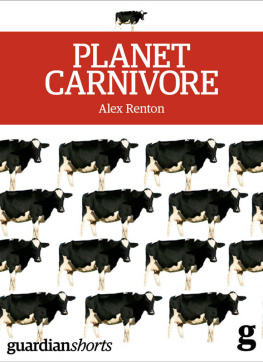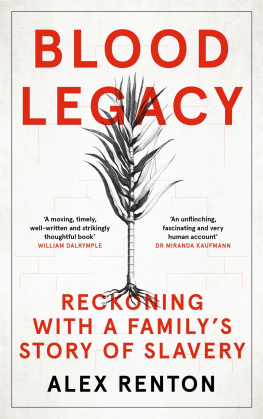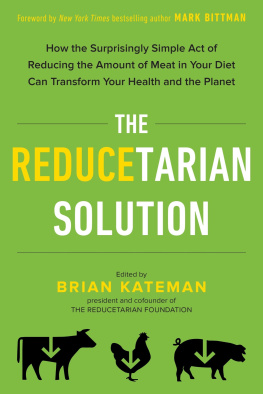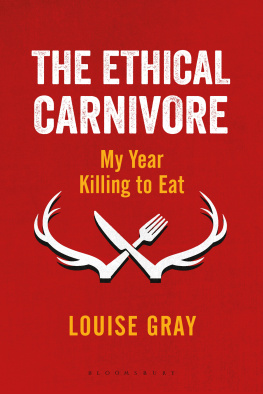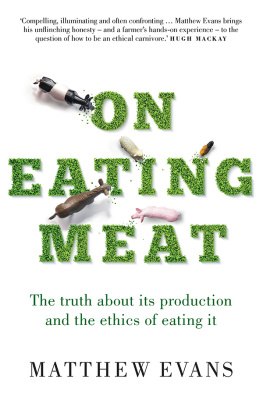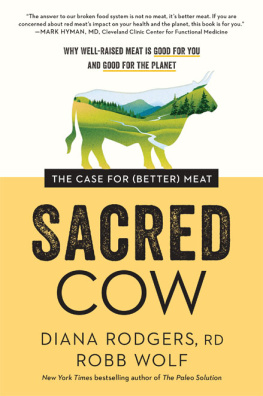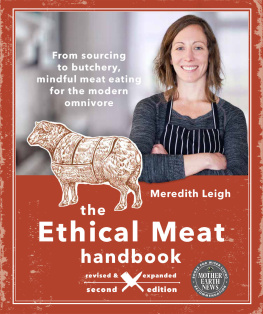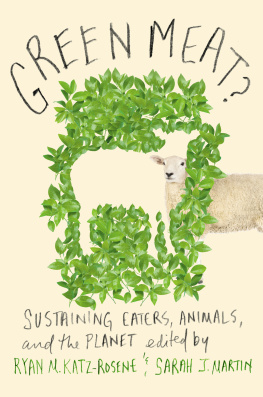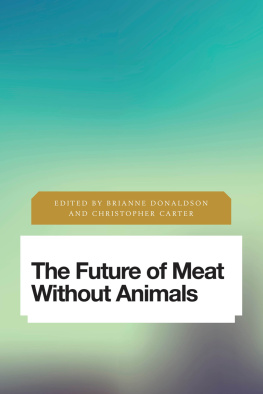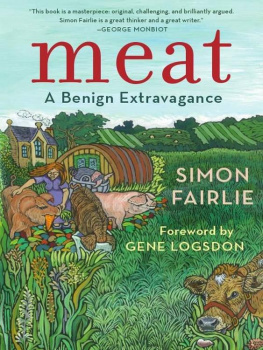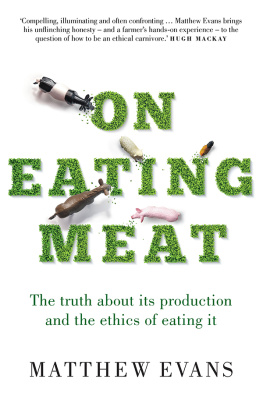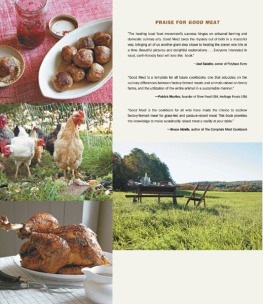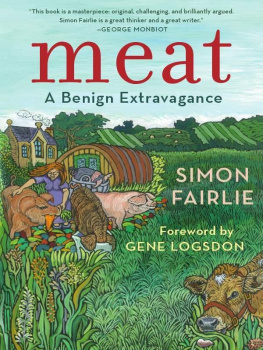
Authors Note:
As a journalist, Ive come to treasure scientific meta-analyses, the research that gathers all the other research on an issue, puts it together and assesses it as a whole. The sum is so often different from the parts. Some meta-analyses feature in this book, particularly in the section on meat and health. While there are many interviews and investigations conducted by me that feature in this book, I have a debt to some greater and far more qualified writers, including Colin Tudge, professors Tim Lang and Vaclav Smil, Paul McMahon, Michael Pollan, Simon Fairlie, Carolyn Steel and Jonathan Safran Foer. I cant claim to have done an academic meta-analysis of their work, but it is blended in this one. (A full list of references for this text can be found at www.alexrenton.com)
In the text the term meat generally refers to the flesh and fat of animals, birds and fish. By animal protein, I mean all edible products of these creatures, including eggs and dairy.
My thanks to Nick Sidwell, Petra Cramsie and, most of all, to Ruth Burnett.
Contents
1: Introduction
Theres a part of me that envies the moral clarity of the vegetarian Yet part of me pities him, too. Dreams of innocence are just that; they usually depend on a denial of reality that can be its own form of hubris.
Michael Pollan, The Omnivores Dilemma
In January 2013 we woke up to some nasty realities about meat. The revelations began simply with a report from an Irish government agency that had carried out DNA tests on a range of ready-to-cook minced beef products. It turned out that in many of them the beef wasnt beef at all. Some of the burgers, from processors in Ireland and the UK, were as much as 29% horse; almost all of them had traces of pork.
Some of the biggest names in European food retailing Tesco, Findus, Asda, Burger King, Lidl, Aldi and more were humiliated in the following weeks. More testing of ready meals and beef products produced more traces of horse. The scandal spread across Europe, as far as Moscow. The disgusting and bizarre revelations continued: a popular beef pie in Iceland was found to contain no animal protein at all.
The inquest continues. But the origins of some of the horse and donkey that got into the beef supply have been traced to eastern Europe. A European ban on desinewed meat a pink slime recovered from animal carcasses with centrifuges and chemicals in April 2012 had created a need at the bottom of the market, where value sausages and the cheap ready meals are sold. A ban on animal-drawn carts on roads in Romania later in 2012 sent a glut of unwanted animals into a grievously under-regulated meat market. Slaughtered in the east, they entered a meandering supply chain stretching all over the continent. With feed prices rising because of speculation and supply pressures on the global commodities market, cheap meat was becoming expensive. Too expensive for a retail system so tightly wound and competitive that it cannot absorb any significant rise in suppliers costs.
Schadenfreude Burgers
Many of us revelled in the Horsegate scandal. For those who worry about the larger food system, especially the harm done by the huge rise in meat consumption, it was the best news in years. The jokes flowed, and so did the crocodile tears: A scandal was inevitable, said Peter Melchett of the Soil Association, acknowledging the benefits that there would be for organic sales. The multiple retailers relentless drive for cheap food comes at a price. In fact, by my count (in a piece written for the Daily Mail at the time) this was no extraordinary event: wed had a major scandal around the food chain every two years of the past decade.
During those weeks, the mood among traditional thats to say, pre-industrial farmers and the organic movement was ebullient. I went to a celebratory horse steak feast at a slow-food French restaurant in Edinburgh. They held a blind taste test: offering horse rump and organic Orkney beef, cooked in the same pan. All 20 of us present preferred the horse. But this was specially bred French pedigree carthorse, not an old nag from the streets of Bucharest.
At that dinner, and in the wider circle of foodies, poverty campaigners and food policy academics, there were hopes that the scandal might provide a spark that would wake the public up to the wider problems that have come with cheap meat. That they would demand the political changes to fix the broken food and agriculture system and its side effects from rural poverty and mistreated animals to environmental damage and global hunger. Not to forget, of course, the new dietary diseases epidemic in the rich world, where food is more plentiful and cheaper than it has ever been in our history.
As the 21st century began, meat, milk, eggs and the other animal food products were historically cheap. Not just in relation to other goods, but cheaper in the ways that affect lives how many minutes you need to work to buy a chicken, the percentage of household income that needs to be spent on a familys Friday fish supper. Twentieth-century food retail with its model of eternal price war (while producing ever-increasing profits and market share) had arrived, it seemed, at an economic sound barrier. To break through it would demand some enormous further change, in marketing and technology. Meat that cheap could no longer be produced in the current system without grave risk to health and the environment and dishonesty.
The collapse in food prices in the 20th century squeezed producers. Their share of the retail price has been halved and halved again in recent years to the extent that, according to government figures, by 2009, with feed prices soaring, two-thirds of British farms were no longer economically viable. Those still in business have been forced to industrialise production and to cut corners, on animal welfare, health, environmental concerns and safety. And, as the pork feed scandal, foot and mouth, BSE, antibiotics in animal feed, the passing-off of farmed catfish as wild cod all showed before the horsemeat scandal appeared, some producers have been forced into insanely risky practices or even criminality.
At the root of the horsemeat scandal was the 12.5p value beef burgers sold by the chains that were exposed: it is just impossible to produce meat so cheap decently with the retail price of standard grade minced beef at 4 a kilo. Despite that, in July 2013 you could again buy eight value beef burgers for 1 at Tesco and minced beef was at the same price as before the scandal but, in a familiar supermarket sleight of hand, the new burgers were 25% smaller than those that had turned out to be nearly one third horse. You can only conclude that, ultimately, the horsemeat scandal was caused by us the cheap meat eaters, blithely and wilfully ignorant.
Business as Usual
Six months on, there had been some changes. Not many. Reviewing the story, there was a call in June 2013 from a British parliamentary committee for people to eat less meat. But political leaders across Europe have shelved the horsemeat scandal as a labelling issue, nothing more. There will be a tightening of regulation. In Britain the investigation had, as of August, produced no prosecutions. Sales of ready meals were still below normal levels. Tesco and Findus remained in the doldrums, as far as markets were concerned. My local butcher said trade had been up all year. But though retail prices of steak were still high, wholesale ones were back to pre-scandal levels. Organic sales were on the up, for the first time since before the 2008 recession. The numbers of people saying they ate less meat or were vegetarian have increased. But the number who say they hadnt and wouldnt change their shopping habits is higher. So its a decent bet with none of the pressures on farmers and processors off that another cheap meat scandal will break before long.
Next page
